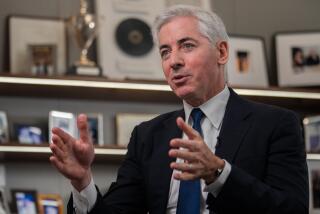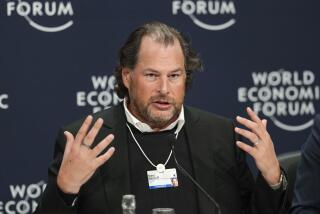Analysis: Misgivings about Gross could buoy Pimco
Pacific Investment Management Co. is, of course, reeling in the wake of the messy departure of co-founder and bond guru Bill Gross: assets are fleeing, its ratings are downgraded, rivals are hitting phones to lure away jittery investors, and the market nervously waits to see if the firm will hold onto its dominant position in the bond business.
But if Pimco has an ace in the hole, it’s what might be called the Pimco Paradox: While the market was roiled by Gross’ departure, that doesn’t mean it was altogether sad to see him go. Investors had been unhappy with his performance for several years, his worse-than-average track record driven largely by a whoppingly wrong call on the direction of interest rates in the wake of extraordinary government efforts to combat the effects of the 2008 financial crisis. Unnerving reports about his personal behavior – odd remarks in public speeches, reported clashes with fellow executives – only compounded investor misgivings that were rooted in dollars and cents.
“Usually when a superstar manager leaves, a lot of cash follows out the door,” says Jon Hale, Morningstar’s director of manager research. “But on the other hand, cash was already heading out the door because of him: because of performance, because of increasingly erratic public comments lately, and all these reports of him being at center of turmoil.”
In other words, while the market was roiled by the way Gross left, that he left is seen by some investors as less of a problem.
Gross’ investment acumen is, of course, the stuff of legend and is largely responsible for Pimco’s rise from its founding in 1971 to a position of dominance in the bond industry, a once-sleepy business that has itself moved to the center of the financial industry. As Gross has reportedly said to colleagues chafing at his belligerent behavior: “I made you all rich.”
But as blogger Josh Brown, flagged by Michael Hiltzik, and others have pointed out, Gross’ undoing at Pimco can be traced to one – very public and very massive – bet he made against U.S. Treasury bonds in early 2011 on the belief that interest rates were artificially low (“robbery” is how he characterized the rate Treasuries paid then). He bet that the yield on U.S. Treasuries would have to rise from the rate at the time, around 3.4%, because huge government borrowing represented massive supply that would lower the price, forcing the government to pay a higher rate to attract investors. Instead, Treasury rates fell as demand in the economy remained weak, huge government borrowing did not crowd out private investment, and global investors in an uncertain world continued to demand the security of U.S. government-backed debt. Indeed, demand remains strong to this day. The yield on the benchmark 10-year Treasury is currently 2.46, and economists like Paul Krugman (among many others) are free to say they told Gross so.
For the last one, three and five years, Pimco’s (that is, Gross’) Total Return Fund has been in the unfamiliar position of looking up at money management rivals in the same category that took a less pessimistic position on government debt, including Blackrock, JP Morgan, Franklin Templeton and others with “total return” funds that resemble the Pimco behemoth, according to Morningstar Inc. Blackrock’s Total Return fund for the last year, for instance, has bested Pimco’s by more than 2 full percentage points, 5.754 to 3.390, a rout in an industry where differences are measured in hundredths of a point.
Partly as a result, money has been flowing out of Pimco, which has seen 16 straight months of outflows from Total Return, from $293 billion in the spring of 2013 to $222 billion as of the end of August (and likely to have accelerated last month), and toward rivals.
Metropolitan West Total Return Fund, run by Los Angeles-based TCW, has a nearly 2 percentage point lead over Total Return over five years, and as a result has been growing rapidly, including about $7 billion flowing to the firm this year, says TWC spokesman Doug Morris.
“We have seen very strong flow from among active fund managers,” Morris says.
Indeed, among those who have out-performed Gross recently is his successor as Pimco’s chief investment officer, Dan Ivascyn, whose $38-billion Income (admittedly smaller and with a different emphasis than Total Return) has posted a sparkling return of 11.61 percent annualized over the last five years, compared to Gross’ 4.56.
Of course, while Pimco managers express relief that the management crisis is over, the loss of a financier of Gross’ stature and considerable investing prowess is still an obvious blow to Pimco and a net negative for investors.
“Any great manager will still have dry spells,” says Rick Keller, chairman of First Foundation Advisors and a co-chair of the Center for Investment and Wealth Management at UC Irvine’s Paul Merage School of Business. “But he’s still one of the great managers and will continue to be so.”
The market will be watching closely Thursday morning when Pimco’s fund flows for September are made public. Evidence of a heavy exodus in Total Return in the last few days would further shake market confidence.
But Gross’ post-crisis track record – not to mention his personal quirks – clearly mitigates the perceived damage of his departure and might just be Pimco’s saving grace.
Twitter: @deanstarkman







